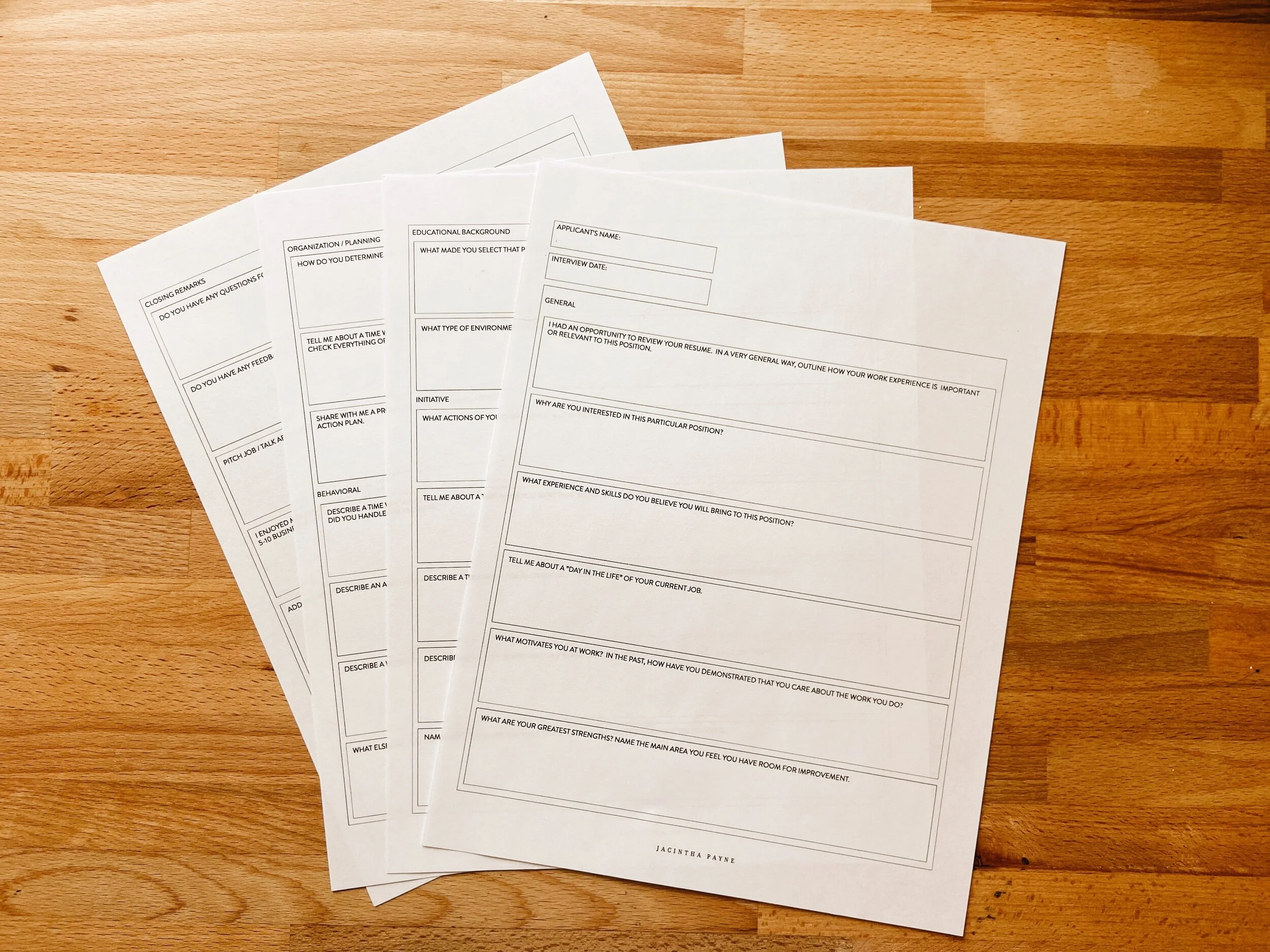HIRING THE RIGHT PERSON FOR THE RIGHT JOB
HIRING THE RIGHT PERSON FOR THE RIGHT JOB
I’ve held several different positions that required me to hire the right people for the right job. During my time as a manager, I had the opportunity to build a team of talented people who contributed to the success of the department. Building the right team requires hiring the right people. To hire the right people, you need to be able to know if the person you’re interviewing is the best fit for the position. From the beginning, I wanted to conduct these interviews in the best way possible. I read books, articles, etc. and found some things that were helpful and some that weren't. I met with people, observed other interviews and in the end, I determined what I believed worked best. Over the years, I found strategies for helping me navigate through applicants and building a successful team.
PREPARING FOR THE INTERVIEW
If you want to grow in your ability to hire the right person for the right job, it’s essential to take time to prepare. Here are some of the things I think through as I prepare for an interview.
KNOW THE APPLICANT BEFOREHAND
It's helpful to know as much as you can about your applicant before the interview. You can’t know everything (or else you wouldn’t need to conduct an interview). But, I've found that there is valuable information contained within an application.
When I look over an application, I try to note anything that jumps out. As I learn about the candidate in their application, it helps guide the questions I ask in the interview. I've found this practice to be important to learning the candidates personality. Personality is important because I usually hire 60% on personality and 40% on skill (depending on the position).
At this point I have a pretty good idea of the strengths and weaknesses of the applicant. I have a set of Interview Questions I use when I'm interviewing someone. As I review an application, I note questions on my list of Interview Questions that will help me draw out specific answers from the applicant. These Interview Questions will help determine if they are a good fit.
Going into the interview, I take the submitted application along with any other information about the candidate. This allows me to have access to all the information I have on the candidate. If possible, I would encourage bringing in a co-worker with you to the interview. This will enable you to talk about the applicant together and discuss the interview in more detail.
Here are few things to think about at you walk into the interview:
Keep your eyes open for good character. You want to hire someone who is Servant Hearted, Organized, Driven, Teachable, Self Starter. People will always describe themselves in this way. It's your job to ask the right questions to verify how they put these traits into action.
Think of your own job specific questions that they are interviewing for.
I.e. if you were asked to do X, how would you respond?
Don’t be afraid to scare the person away. They are coming to you because they want the job. You don’t want someone who scares easy.
BEGINNING THE INTERVIEW
When you walk into an interview you want to make the person you are interviewing feel as comfortable as possible, as quickly as possible. Only when someone is comfortable will they let their guard down and be more likely to show you their true colors. I am an advocate of taking notes during an interview. Sometimes, this can be unsettling for the applicant. But I've found communicating your intention of taking notes will prepare them and wont distract them in the middle of their thoughts. A great time to take notes is during awkward pauses, but be sure to put your pen away when they are opening up about their weaknesses. Hold on to your thoughts and wait for silences to write them down.
Here are some things to consider as you begin your interview:
Be up front about the mission of the organization. This will allow them to know what they are committing to with the job.
Higher level interviews should typically last longer and take place over several interviews. But regardless of the position, take each interview seriously. All of your employees are important pieces of your team and a good team creates a successful work environment.
ASKING ALL THE RIGHT QUESTIONS
Once you settle into your interview and make your applicant feel as comfortable as possible, begin asking questions. You want the questions to make people think. Even if the person interviewing begins struggling, don't answer the questions for them.
If you are struggling to think of questions the document linked in this article can help provide some for you. These questions cover the following topics:
General
Education/Background
Initiative
Organization/Planning
Behavioral
Within each one of these sections are a handful of questions that will provide answers to how this person would fit into the job they are applying for. You don’t want to ask every question. Sometimes, you will find the person you are interviewing to be a “talker.” Talkers will give you answers to questions before you are ever able to ask them. This is okay! Don’t feel stuck to the script of asking the questions.
Here are some things to consider as you ask questions:
Really listen! When you really listen you are able to respond to them and have a beneficial conversation. Don’t make the mistake of thinking about what you want to ask next - you will miss out on getting to know the person you are interviewing.
If the person you are interviewing begins struggling to provide an answer you are looking for, you can ask a different question from the same category to help pull out the answer.
CLOSING THE INTERVIEW
After you’ve worked through most of your questions, you will have a pretty good idea if:
You like the person and are interested in getting to know them better.
You know they are not a good fit for this job and the position.
If you like the person, take time to pitch the job and help them understand more about what they are interviewing for. If you don't like the person, ask the person you are interviewing if they have any more questions for you and then close out the interview.
I hope that helps! What are some interview questions or approaches that you have found helpful?
| Credits: Author - Jacintha Payne; Photography - Calvin Payne |


